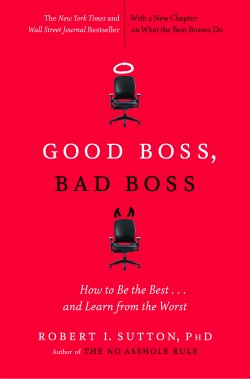
This is the first post in a series excerpted from a new chapter in the paperback version of Good Boss, Bad Boss, a New York Times bestseller by Robert Sutton. Read the first installment, Are You A Power Poisoned Boss? here.
Making subtraction a way of life isn't a theme raised in Good Boss, Bad Boss, but as I began thinking about many of the main ideas, and Matthew May's great book In Pursuit of Elegance, I realized that great bosses have a "subtraction mind-set." They are always looking to remove bad or necessary things.
As we know, "bad is stronger than good.” Getting rid of bad people is probably even more crucial than bringing in great people. We saw, for example, how Paul Purcell enforces the "no-asshole rule" at Baird. Removing selfish jerks has not only made Baird a civilized place but has helped keep it on Fortune's Top 100 Best Companies to Work For list since 2004. And it has helped Baird grow and improve profits in recent years even as many other financial services firms faltered and failed.
When I speak to managers and executives, rotten apples provoke especially strong reactions. At the gathering of high-tech CEOs mentioned above, there was an interesting 90-minute stretch where each described "what keeps me up at night." One said it was a star executive who brought in a lot of business but was driving away good people. There was consensus among his fellow CEOs that "we all have seen this movie before" and they all learned, after firing someone like that, "You always ask yourself, why did I wait so long? Things are so much better now!"
Another way some bosses deal with rotten apples--especially those with skills that are tough to replace or who have so much job security they are impossible to fire--is to "subtract them" physically, to isolate them so they don't infect others. As I wrote in a Wall Street Journal article: "In one organization, there was a deeply skilled and incredibly nasty engineer whom leaders could not bring themselves to fire. So, they rented a beautiful private office for him several blocks from the building where his colleagues worked. His coworkers were a lot happier--and so was he, since he preferred working alone."
Bad apples aren't the only thing that great bosses remove.
Cumbersome rules and procedures waste time and energy--so great bosses find ways to simplify and eliminate them. After the General Motors bankruptcy in 2009, CEO Rick Wagoner was fired and replaced with Ed Whitacre. He immediately started slashing away at GM's maze of irratio- nal and ingrained procedures—such as cutting the num- ber of reports prepared by his research group from ninety-four to four per year. Whitacre's blazingly obvious belief was doing so would allow researchers to spend more time researching and less time writing reports.
Good bosses don't just get rid of bad things like rotten apples and idiotic rules and procedures. They know that too much of good thing can be terrible, too--because humans have limited cognitive and emotional capacities. So anything that can be done to remove unnecessary or less important demands can enhance performance on the chores that matter most. This is one reason the best bosses shield their charges from unnecessary work and interruptions--even fun and interesting ones. I dug up an intriguing remedy that Intel experimented with, which I wrote about in the Harvard Business Review:
In 2008, 300 engineers and managers at semiconductor giant Intel participated in a pilot program where, for four hours every Tuesday morning, they set their e-mail and IM clients to "offline," directed phone calls to voice mail, avoided scheduling meetings, and isolated themselves from visitors by putting "do not disturb" signs at the entrances to their workspaces. This "thinking time" program was run by engineer Nathan Zeldes, who reported it enhanced "effectiveness, efficiency and quality of life for numerous employees"; 71% of participants recommended that it be extended to other groups.
 This "too much of a good thing" problem also applies to procedures. Too often, the underlying idea is sound, but they are overly complex and time-consuming. JetBlue executive Bonny Simi and her team overhauled their performance-review process. They scrapped the old evaluation form, which took two hours to complete, and replaced it with one that took 20 minutes. Bonny emphasized that the basic categories and links to corporate goals on the old form were retained because they were useful--but massively simplified.
This "too much of a good thing" problem also applies to procedures. Too often, the underlying idea is sound, but they are overly complex and time-consuming. JetBlue executive Bonny Simi and her team overhauled their performance-review process. They scrapped the old evaluation form, which took two hours to complete, and replaced it with one that took 20 minutes. Bonny emphasized that the basic categories and links to corporate goals on the old form were retained because they were useful--but massively simplified.
The lesson here isn't so much about these specific subtraction stories, even if they are instructive. Rather, it is about the subtraction mind-set, that every boss ought to keep searching for things to remove and simplify--and ways to make life less frustrating and annoying. Great bosses live the motto "When in doubt, take it out."
[Image: Flickr user MrB-MMX]